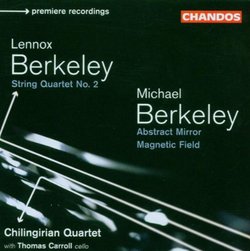| All Artists: Lennox Berkeley, Michael Berkeley, Chilingirian Quartet, Thomas Carroll Title: Lennox Berkeley: String Quartet No. 2; Michael Berkeley: Abstract Mirror; Magnetic Field Members Wishing: 0 Total Copies: 0 Label: Chandos Original Release Date: 1/1/2006 Re-Release Date: 4/18/2006 Genre: Classical Styles: Chamber Music, Historical Periods, Classical (c.1770-1830) Number of Discs: 1 SwapaCD Credits: 1 UPC: 095115136423 |
Search - Lennox Berkeley, Michael Berkeley, Chilingirian Quartet :: Lennox Berkeley: String Quartet No. 2; Michael Berkeley: Abstract Mirror; Magnetic Field
 | Lennox Berkeley, Michael Berkeley, Chilingirian Quartet Lennox Berkeley: String Quartet No. 2; Michael Berkeley: Abstract Mirror; Magnetic Field Genre: Classical
|
Larger Image |
CD Details |
CD ReviewsFather-and-son series: a fine pair Discophage | France | 03/24/2009 (4 out of 5 stars) "This is a brilliant series that Chandos has been devoting to father and son, (Sir)Lennox and Michael Berkeley. The history of music indicates that it's hard to be the composer son - or father - of a composer. Who listens to Siegfried Wagner's music, or to Leopold Mozart's? The Bach sons enjoyed a better posterity, although they are no match for papa - rather, for the music lover, an occasional escapade from daddy's more substantial and spiritual stuff. And did you even know that Wolfgang left a son, Franz Xaver (the youngest of his two surviving ones, born a few months before his father's death), who dabbled in composition as well (and studied with, guess who? Salieri)? Well, posterity did away with him, that's for sure.
Not so with Lennox and Michael, it seems. I wouldn't say that Sir Lennox Berkeley belongs to the major 20th Century British composers - am I consensus-seeking enough in saying that this honor belongs rather to Vaughan Williams, Holst, Bax, Bridge, Walton, Britten and Tippett - but he's carved a special niche for himself among the good small British masters. And I would be tempted to say the same of Michael's standing among his peers - and although Michael's first compositions date from the late 1970s, in that broad category I'll include those who started composing in the second half of the 20th Century, which allows me to mention Simpson, Maxwell Davies and Birtwistle as the major composers there. A preference for the chamber works of father or son here will be a matter of taste. By his own admission, Lennox's 2nd String Quartet, composed in 1940 and a relatively early work (and incredibly, this is its first recording), was influenced by the French music of the late nineteenth and early twentieth centuries in its clarity, order and subtle emotional climate, and in "a certain type of harmony... that one finds later in the music of Poulenc in particular". But if you think of Franck, Fauré, Debussy and Ravel - and even Poulenc, you'd be wide off the mark. Berkeley's Quartet is more angular than that, filled with a tense lyricism. There's nothing of Poulenc's genial jollity. Roussel may come to mind, although Berkeley's is more high-strung, syncopated and expressionistic, in a way that seems to look more to Germany and Central Europe. It is an enjoyable piece, although it doesn't stand out for its exceptional originality, as does Blacher's Second (which is worth mentioning, as it was composed the same year) or Britten's first (composed a year later). I find Michael's two compositions ultimately more original. Magnetic Field was written in 1995 and inspired by Purcell's Fantasia upon One Note. Berkeley uses an F, played by all four instruments at the beginning of the piece, as a "magnetic force" from and around which everything develops. It is fascinating to hear how the music "morphs out", so to speak, of the single, introductory tone, by way of quarter-note glissandos and other processes, and ultimately returns there. Berkeley has a keen imagination for color and the piece is highly atmospheric, tense at times (yes, this is "contemporary music"), highly lyrical in other passages. Lutoslawski came to mind at times. Abstract Mirror, which opens the disc (son's two pieces frame dad's), was composed in 2002 and is scored for string quintet, with an added cello, like Schubert's, an avowed model for Berkeley. The overall impression is that of a more episodic and jagged composition. One of its seminal opening themes is an explosive run played by the cellos, and that gesture informs much of the piece. There are many moments of intense violence and tense lyricism. The moments of repose - in the form of calm chords centered around the same F as in the earlier work - are short-lived and always troubled by the undercurrent of agitation and violence. The chamber music of Michael Berkeley, as exemplified here, is fully contemporary, without being aggressively so. The Chilingirian Quartet seems entirely attuned to the music and plays with fine tonal qualities. TT 55-minutes, good liner notes. I'll put up this disc in my shelves under Michael Berkeley - not that it'll be as far removed from its disc mate's other compositions as in a disc pairing, say, Thomas Adès and Frank Zappa. And anyway, I don't think I have any other CDs devoted solely to Lennox in my collection (but I do have a small handful of Michael's). " |

 Track Listings (5) - Disc #1
Track Listings (5) - Disc #1